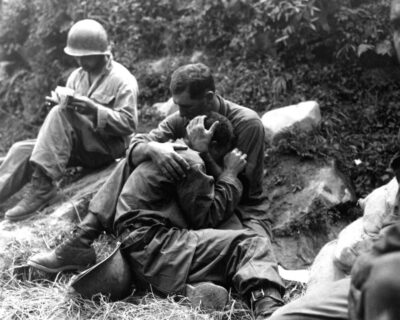Military psychologists recently coined the term moral injury to describe the root cause of an epidemic of suicide, depression and substance abuse afflicting returning war veterans. Over 500 vets of Iraq and Afghanistan attempt suicide each month. Twenty-two per day took their own lives in 2009 and 2010 – many more than were killed in combat. One Marine Corps infantry unit deployed to Afghanistan had suicide rates fourteen times higher than the civilian population.

The United States is a famously patriotic country. Opinion polling shows 78% of Americans believe the military “contributes a lot” to society, compared to a mere 30% for artists and 18% for lawyers. And while Americans idolize their military, there is evidence that many soldiers are surprisingly poor at killing people. In the aftermath of Gettysburg over 28,000 muskets were recovered from the battlefield, 25,000 of which were discovered to be loaded and half of those were double loaded. One gun had 24 musket balls jammed down the barrel. Some observers have concluded that even amidst that blood-soaked conflict, many soldiers would rather feign firing than actually shoot their weapon at another human.
In 1947, the chief US Army combat historian Brigadier General S.L.A. Marshall authored his seminal study Men Against Fire alleging that only one quarter of GI’s ever fired their weapons in World War II. To get around this vexing problem of pervasive humanity, military planners introduced “reflexive fire training” – specifically conditioning recruits to shoot their weapons without thinking. Gone were traditional bulls eye targets, replaced with human-shaped cutouts that fell over when shot. While this raised firing rates to over 90% in Viet Nam, something in the empathic human psyche has got to give.
A recent in the Journal of Military Psychology coldly noted:
Reflexive fire training interrupts the instinct to avoid killing and removes the service member's moment of decision, leaving him or her no time to consider the moral conflict until after the kill. With the increase of non-uniformed troops and potentially hostile civilians in the modern wars, the probability of post-killing moral conflict (and thereby moral injury) has grown exponentially.
In other words, soldiers from a society where killing is almost never acceptable are immersed in a situation where killing is often unavoidable and specifically trained to avoid thinking about it. Coming home superficially hailed as heroes, the jarring moral disconnect leads many vets to drink destructively, kill themselves or drown their girlfriend in the bathtub.
It seems there is no ethical free lunch. Even with $600 billion in annual resources – more than half of all US public spending – the military still cannot train soldiers to both kill and feel ok about it. Besides the human tragedy of moral war wounds, treating PTSD among recent returning veterans costs the US government over $2 billion. The next frontier of moral workarounds for military planners may involve taking people out of the equation altogether through the terrifying prospect of autonomous weapons.
The principle of net mirth seems hardwired into most normal humans, as illustrated by the enduring prevalence of moral injury even among highly trained military personnel exposed to horrors of combat. This stubborn morality creates an economic onus for military beancounters and the tech sector to make war more automated, and perhaps more horrible.